Essential Lesson for Children: Serving People
In 1924 the Republican Party nominated Calvin Coolidge for a full term. His campaign slogan was “Keep Cool and Keep Coolidge.”
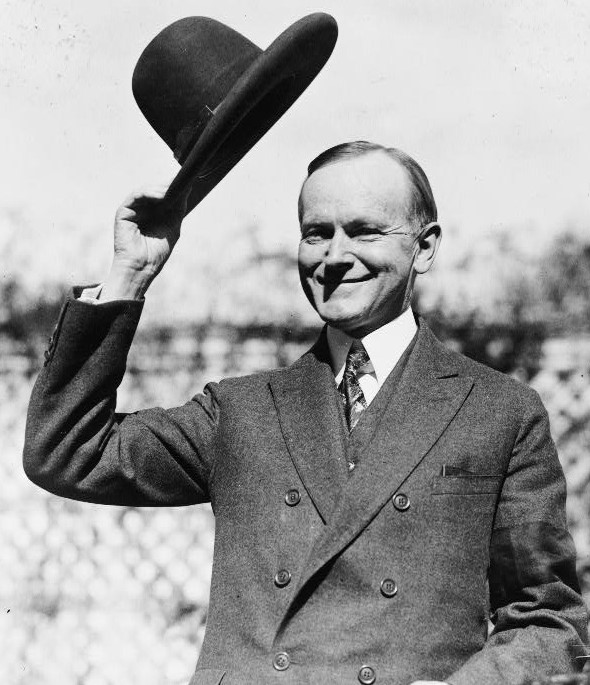
Coolidge, October 1924
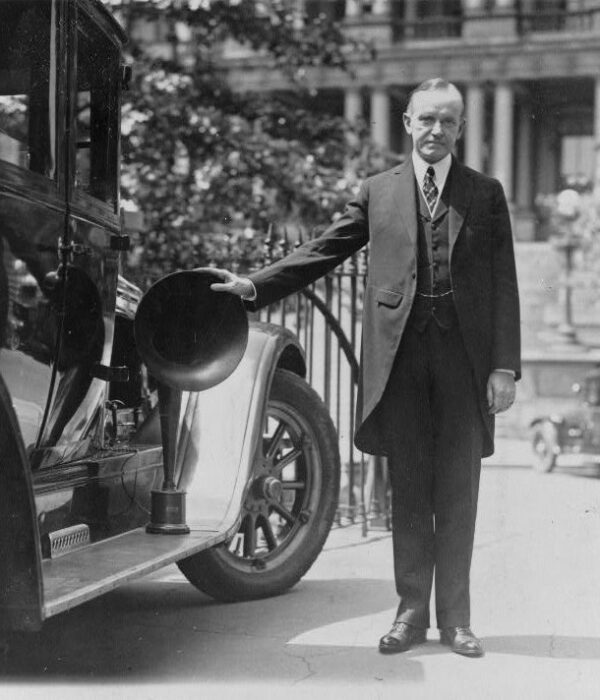
Coolidge with radio equipment used in the campaign, 1924.
Coolidge was elected easily. He was inaugurated in 1925.
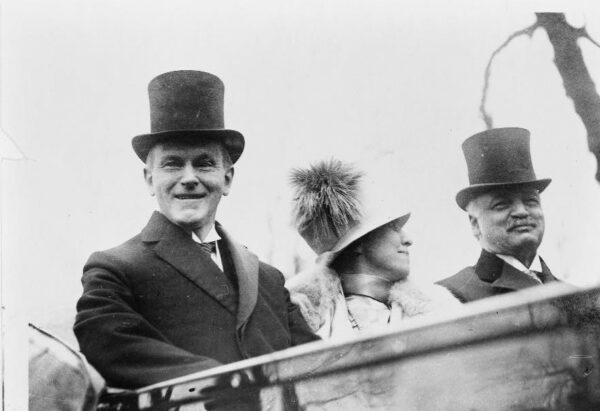
President Calvin Coolidge, First Lady Grace Coolidge, and Senator Charles Curtis
The president and first lady rode to the inauguration with Senator Charles Curtis of Kansas. Curtis was the great-great-grandson of White Plume, a chief of the Kansa-Kaw Nation who assisted Lewis and Clark in 1804 during their Voyage of Discovery through the Louisiana Purchase. Curtis liked to say that he was “one-eighth Kaw Indian and 100 percent Republican (Curtis became vice president in 1929).
The setting of Coolidge’s oath of office in 1925 was vastly different from the setting of his oath in 1923 when his father administered the oath by the light of a coal oil lamp in the middle of the night in his parlor. Former president and current chief justice of the Supreme Court, William Howard Taft, administered the oath in 1925. Taft was the first ex-president to administer the oath. Americans heard the ceremony for the first time by radio.
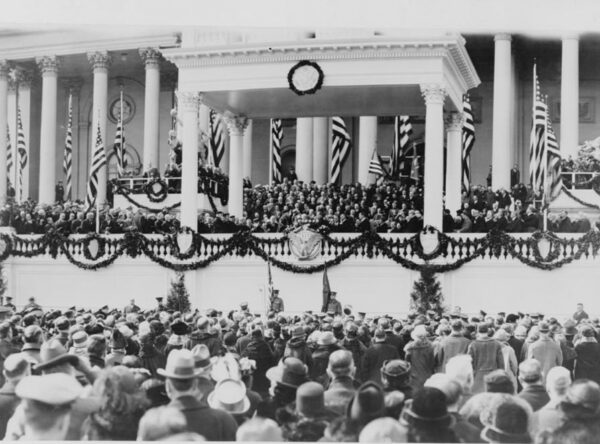
Coolidge takes the oath of office on the steps of the U.S. Capitol, 1925.
Always thrifty and budget conscious, the Coolidge inauguration cost $60,000 less than the money that had been donated. Coolidge instructed that the extra money be returned.
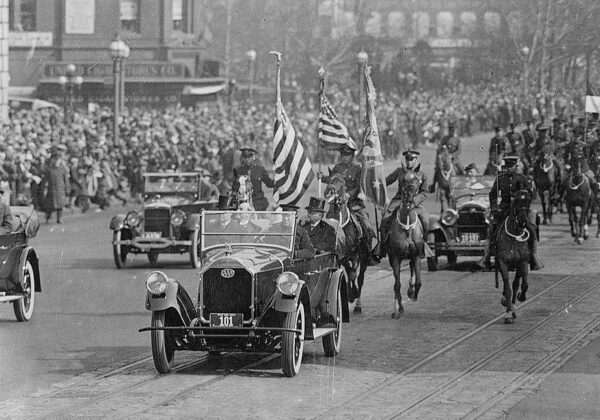
Inaugural parade, 1925
When Coolidge was growing up, his father was responsible for collecting local taxes. In his Autobiography, Coolidge wrote: “As I went about with my father when he collected taxes, I knew that when taxes were paid some one had to work to earn the money to pay them.” As president, Coolidge worked to improve the nation’s economy. During his presidency:
- Tax rates declined significantly.
- The federal budget went down from $5.1 billion in 1921 to $3.1 billion in 1929.
- The national debt was lowered from $22.3 billion in 1923 to $16.9 billion in 1929.
President Coolidge cared about the rights of black Americans, members of native nations, and new immigrants from other countries. Speaking of tolerance, he said:
By tolerance I do not mean indifference to evil. I mean respect for different kinds of good. Whether one traces his Americanism back three centuries to the Mayflower, or three years to the steerage [meaning immigrants arriving by ship], is not half so important as whether his Americanism of today is real and genuine. No matter by what various crafts we came here, we are all now in the same boat.
In his first address to Congress in December 1923, he recommended that the federal government provide funds for a medical school at historically black Howard University to encourage the training of the 500 additional black physicians that were needed each year. In his June 1924 commencement address at Howard, he praised the efforts of black American soldiers in World War I. He tried unsuccessfully to pass an anti-lynching law.
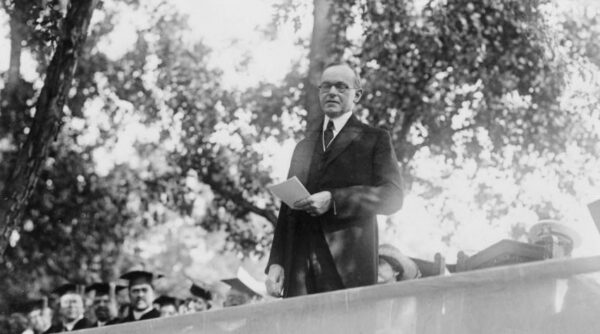
Coolidge speaks at the 1924 commencement ceremony at Howard University.
President Coolidge was proud that he had native nation blood through his father. He enthusiastically signed the Indian Citizenship Act of 1924.
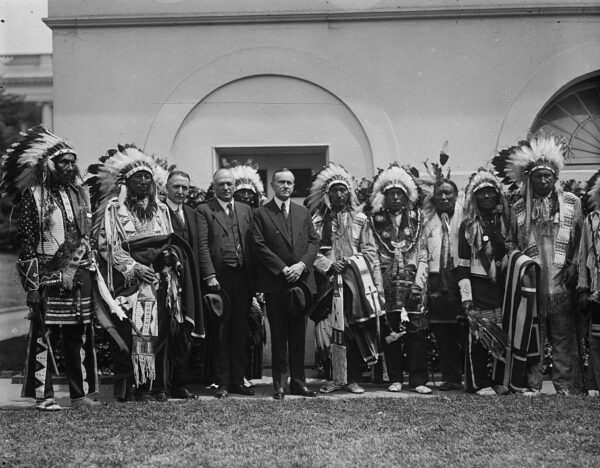
Coolidge meets with members of native nations at the White House, 1925.
On May 21, 1927, Charles A. Lindbergh landed in Paris, France, becoming the first person to complete a solo, nonstop flight across the Atlantic Ocean. In March 1928, President Coolidge awarded him the Congressional Medal of Honor.
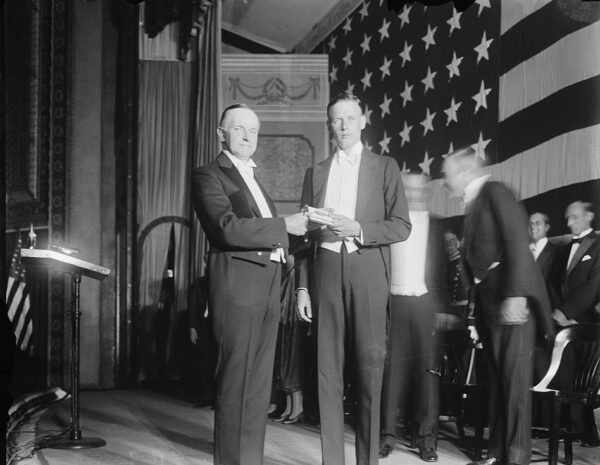
Coolidge awards Lindbergh the Congressional Medal of Honor.
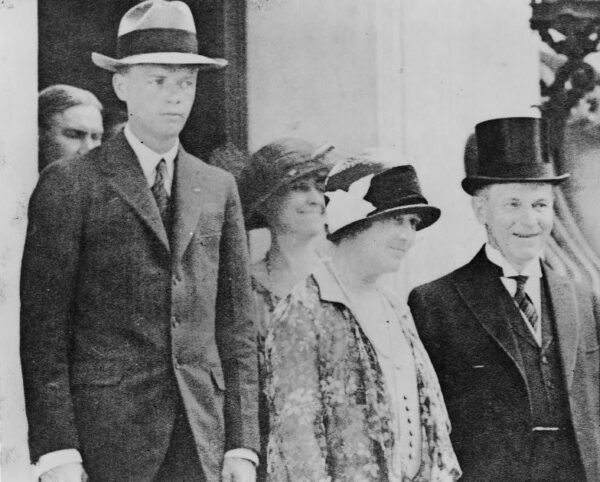
Charles Lindbergh, First Lady Grace Coolidge, Evangeline Lindbergh (Lindbergh’s mother), and President Coolidge
In the past, many U.S. presidents left Washington, D.C., to spend the summer in cooler locations. President and Mrs. Coolidge spent the summer of 1927 in the Black Hills of South Dakota. While there, he made a speech at the dedication of the start of the work on the Mount Rushmore National Memorial (then called the Shrine of Democracy).
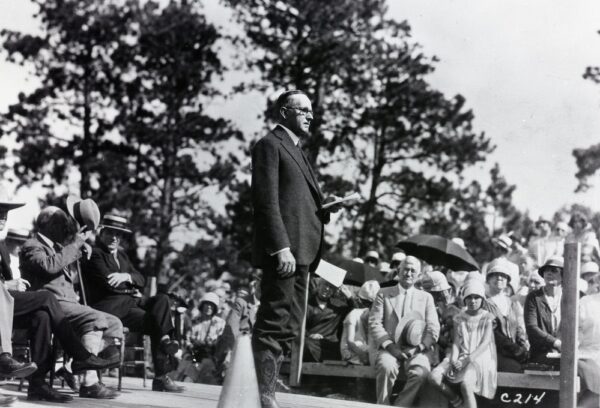
President Coolidge dedicates the Shrine of Democracy, 1927.
Courtesy National Park Service, photo by Charles D’Emery.
The speech began:
We have come here to dedicate a cornerstone that was laid by the hand of the Almighty. On this towering wall of Rushmore, in the heart of the Black Hills, is to be inscribed a memorial which will represent some of the outstanding features of four of our Presidents, laid on by the hand of a great artist in sculpture. This memorial will crown the height of land between the Rocky Mountains and the Atlantic seaboard, where coming generations may view it for all time.
Calvin Coolidge was a popular American president who likely would have been reelected in 1928. However, Coolidge surprised newspaper reporters a few days before his speech at Mount Rushmore. He wrote one sentence on a scrap of white, blue-lined paper and gave it to his secretary to type and hand out to newspaper reports. The paper said: “I do not choose to run for president in 1928.” His announcement was a year and a half before the end of his term. In his Autobiography, he said:
We draw our Presidents from the people. It is a wholesome thing for them to return to the people. I came from them. I wish to be one of them again.
Today the term public servant may sound outdated because so many office holders whose names and faces are in the news seem to be anything but servants. The online Merriam Webster dictionary defines public servant as a government official or employee. I believe Calvin Coolidge would define it differently. If we still used dictionaries that had pages in a book we held in our hands, I think the face of Calvin Coolidge would be a good choice to place beside the definition for public servant.
Jesus calls every Christian to be a sort of public servant in the broadest definition. We are all to be servants of people. That is an essential lesson to teach our children.
For you were called to freedom, brethren;
only do not turn your freedom into an opportunity for the flesh,
but through love serve one another.
For the whole Law is fulfilled in one word, in the statement,
“You shall love your neighbor as yourself.”
Galatians 5:13-14
To read Charlene’s entire series on Calvin Coolidge, click here.
All photos, except the Mount Rushmore dedication, are courtesy of the Library of Congress.

